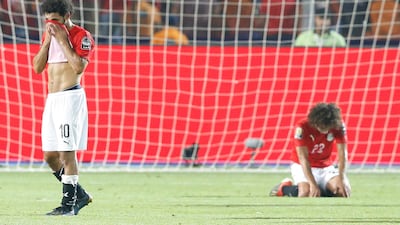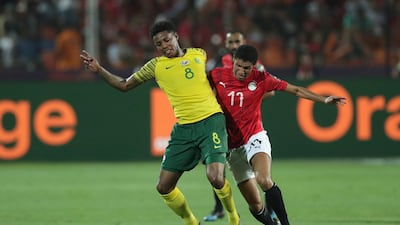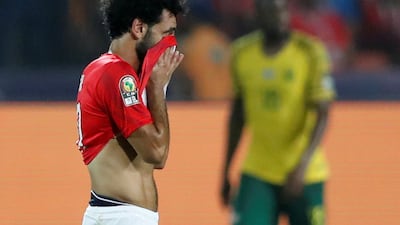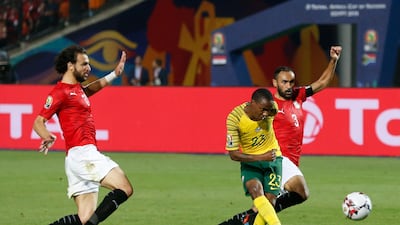The final whistle rang out at the Cairo International Stadium on Saturday evening and reality hit for Egyptian football fans.
They were out of the Africa Cup of Nations, beaten 1-0 by South Africa at the last-16 stage in a game they had been expected to win.
There was the immediate sight of a tearful Mohamed Salah, so used to success in recent times with Liverpool, coming to terms with disappointment when expectations had been so high.
As the striker and his grim faced teammates walked solemnly toward the tunnel, two empty water bottles were thrown at them. Neither hit their intended target, perhaps symbolic of a night to forget all round.
In contrast, the Egyptian fans applauded the South Africans when they went over to greet their tiny contingent of fans - an act of sportsmanship that is all the more admirable given the massive disappointment they felt at that time.
It had been level until the 85th minute on Saturday before Thembinkosi Lorch struck what proved to be the only goal of the game, but there was no disdain towards the South Africans from the hosts for their achievement in pulling off arguably the biggest shock of the competition so far.
While Egypt woke up on Sunday to a sense of frustration, it was to a sense of objectivity too in some quarters.
"It makes sense. We don't deserve to advance beyond the round of 16," Karim Ramzy, the popular host of a popular sports TV programme in Egypt, wrote on Facebook.
Egypt, while enjoying a 100 per cent record in the group stages, had not convinced and their hopes ended at the first knockout phase and Ramzy was not the only one not shocked by the setback.
The defeat was all the more painful because Egypt had promptly stepped forward in December to host the tournament after Cameroon, the original host, was deemed not ready to do so.
Egypt spent millions of dollars to upgrade the six venues used and saw a well-organised tournament as the perfect addition to the country's current presidency of the African Union.
Egyptian President Abdel Fattah El Sisi also showed personal interest in the organisation, meeting several times with officials to ensure that everything was ready.
It is no wonder that the fallout from Egypt's surprise departure was both quick and unmitigated.
The chairman of the Egyptian football Federation, Hany Abo Rida, and his board members resigned.
Manager Javier Aguirre, reportedly the highest paid coach in the the 24-nation tournament, was fired on Saturday night, shortly after he had taken responsibility for the loss when he spoke to media.
A pro-government newspaper said an official probe would soon be launched into what it called corrupt practices at the federation, although that has not been officially confirmed.
In many ways what happened on Saturday mirrored the country's ill-fated campaign in the World Cup in Russia last year, when they lost all three group matches amid allegations of lack of discipline in the squad and, again, corrupt practices by federation and team officials behind the scenes.
Aguirre's selection of the squad has been questioned for weeks, with pundits and commentators claiming that he left out better players in certain positions.
Following Saturday's loss many on social media and television talk shows raised questions about the former Al Wahda chief's tactical abilities and even whether he had adequate knowledge of the abilities and limitations of the players.
The team was mired in controversy half way through the group stage when midfielder Amr Warda was thrown out of the squad over allegations of sexual harassment only to be later reinstated after a players' revolt.
That was led by Salah, whose defence of Warda in a series of English-language tweets earned the Liverpool striker the scathing criticism of some fans and critical media coverage.
The incident earned the side the unflattering nickname "National Team of Sexual Harassers".
"You had it coming, harassers," wrote a female university professor from Egypt on Facebook. "You don't deserve to represent Egypt."
The tournament goes on, just not with the home nation in action again.
It will be a painful watch until July 19, when the final takes place in Cairo, for the country's football enthusiasts.
But the post mortem into what went wrong for Egypt is likely to go on well beyond then.













